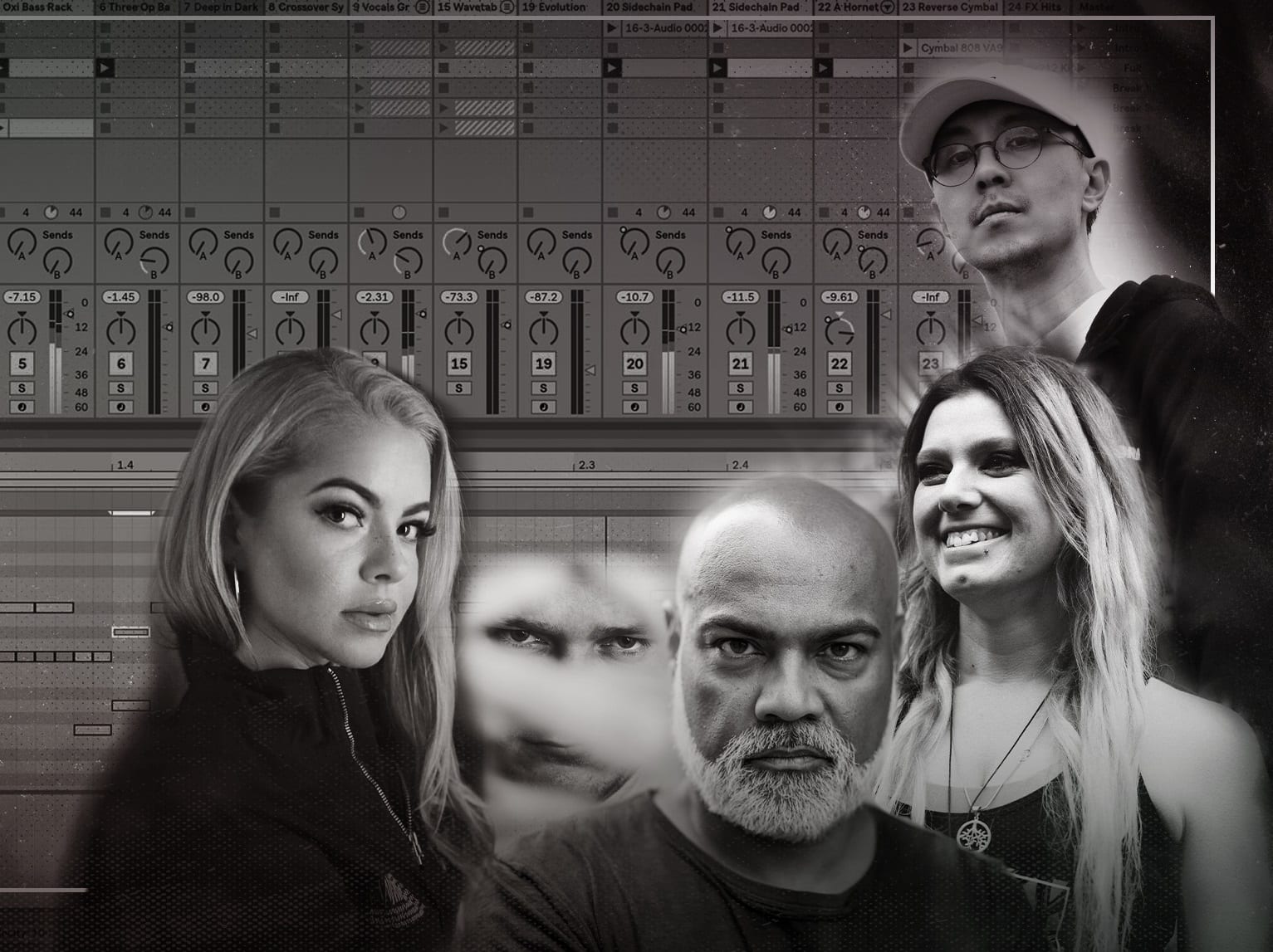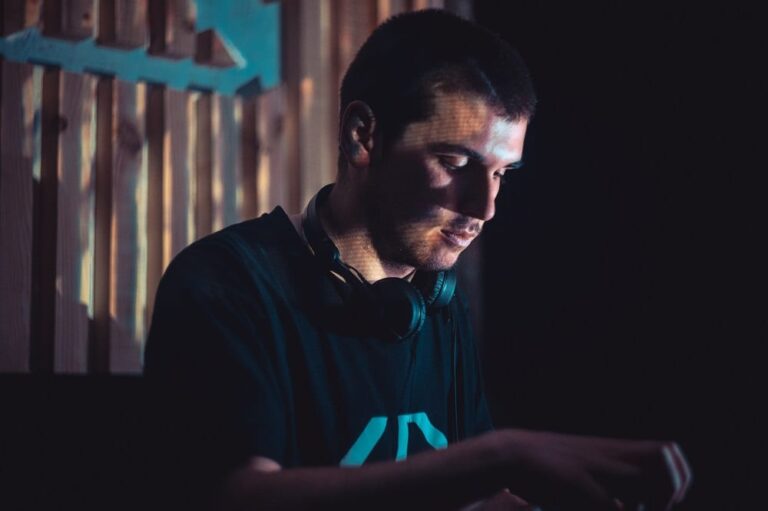Music production for many of us can be a pipe dream that never comes into fruition due to work commitments, time restraints and, well let’s face it… the idea is daunting. 9 to 5 jobs, social life and everything else in between can make the mere thought of learning such a skill seem near impossible. However, with both the extra time brought upon many by the continued club shutdown, regional lockdowns and furloughs – PLUS the increasing ease of access to YouTube tutorials and production software – many now find themselves finally ready to experiment.
Artists like Stranjah, Myth and missledz have taken time to use their proficiency in production to teach others through online tutorials and in some cases 1-1 tuition, allowing for what Stranjah refers to as the “democratisation” of knowledge. Catching up with them, Ray Keith and Harriet Jaxxon, I gather an array of helpful advice geared towards newcomers – everything from choosing a DAW, and how to professionally approach labels.
Founder of Deviant Audio and Canadian bass music guru Stranjah is currently one of the most prominent figureheads in the YouTube tutorial scene. His diverse musical output over the years on iconic labels like Metalheadz, Critical and Renegade Hardware shows in his tutorials, with videos spanning everything from how to make ambient jungle to UK Garage, and even how to recreate specific songs like Bacteria by Ed Rush & Optical. The level of technical expertise in his videos alone are a goldmine for new producers, and a far cry from the days of the early jungle pioneers working out how to navigate menus on the AKAI MPC on their lonesome.
“In the 90s the software was a lot more basic, which gave me a deeper appreciation of how to construct sound,” he explains as we discuss how technology has transformed since the early days. “During those days you would have to build everything from the ground up, as opposed to today where you have all these nice software VST synths and packaged sample packs. The times have definitely changed, and with these new tools producers can focus on the creative aspect without having to spend so much time with the manual labour of building sounds.”
What DAW should I choose?
It can be daunting faced with the huge array of popular DAWs right now, with Ableton, FL Studio, Logic Pro, Cubase and numerous others all being used across the board. The general consensus is, unsurprisingly, to try out various trials and friend’s copies of the software before choosing one that fits your workflow.
Bristol-based producer Myth (also known for his work under the Ill Truth alias) has made a name for himself through his crisp production and versatile musicality, as well as recently delving into the world of YouTube tutorials. As someone who has worked their way through most DAWs and is now settled with Logic Pro, he gives some more useful pointers on where you can take your DAW selection.
“It depends on whether you’re a technical person or visual. If you prefer visual cues then something like Studio One or Logic might be better, where the arrangement is pretty much all visual and it’s quite obvious where you’re clicking and stuff. However, if you’re technically minded then something like FL Studio or Ableton might be better.”
After years of experimenting with hardware, rudimentary ‘tracker’ software as well other DAWs like Cubase, Stranjah eventually settled on Ableton. “I see it as taking away the middleman between you and your ideas,” he explains. “It’s more direct, it’s easier to put down your ideas and get a creative flow.”
What other equipment do I need to start up?
“I think at the end of the day, it’s where you want to take your sound”, Dread Recordings honcho Ray Keith tells me. “Is it for a bit of fun? Is it a low-key thing or actually do you want to make a living out of it?” While tunes like Terrorist and Dark Soldier paved the way in jungle and drum and bass for years to come, the now legendary-status producer puts much of his energy into helping new talent come through his label.
He describes himself as “analogue stroke digital” having seen both the reliance of hardware in the early days of the genre and the more than capable software that is now readily available. “I’m the best of both worlds – but each to their own. There’s no format for music now is there?”
Like many, Stranjah believes the bare minimum for new producers is ideally a computer, a DAW and some headphones. “Software has just gotten so good that you’re able to get very close to analogue sounding mixes today.”
Myth also agrees with this sentiment, explaining that he recently sold all of his equipment apart from his soundcard and MIDI keyboard. “I’m just convinced that you don’t need any of it. I don’t even have monitors anymore. I literally just have my set of headphones, my Logic setup, the UAD soundcard, and the Native Instruments MIDI keyboard. That’s all I’ve got and I’m writing my album like that. In fact, every tune I’ve written as Myth was mixed down in iPod headphones.”
“There are certain things I wouldn’t mind having, but it’s mostly digital now. Everything sounds so good,” he explains. It essentially goes back to what Ray Keith said about where you want to take your music. There is nothing wrong with investing in extra hardware, and in some cases, it may help shape your sound, but your true strengths lie in the time you put into it, not the money you initially throw at it.
I’ve got all the essentials… what next?
missledz explains that it was overwhelming first diving into production, often finding that tutorials she was watching were too advanced at the time. “I remember I didn’t even know what a compressor did or what saturation was,” she tells me.
While a newer name to the scene, missledz is establishing herself quickly with her brand of deep, tech-infused rolling drum and bass. She has combined her love of the genre with her experience in primary school teaching to help aspiring producers learn through online tutorials. “I still don’t really feel like I have a deep technical understanding of a lot of things in production,” she explains. “But there are things that I can explain well and things that I’m confident at.”
“I think having a lot of patience is important,” says Stranjah. “It takes many hours of devotion to get really good. I would say focus on the basics, learn how to make a really strong beat, once you’ve mastered that then learn how to write a bassline. Don’t be afraid to start with presets, there’s tons of really good presets and samples today.”
Ray Keith takes a similar stance for beginners. “Listen, it’s all about the music. You can spend five hours making a bassline, or you can pick and play one in three seconds. It’s about making the music and making it fit. I think sometimes a lot of people have got their engineer head on and they find it difficult to make music because they haven’t got their writing head on.”
“I definitely follow a vibe rather than theory,” agrees Harriet Jaxxon, an artist who has been honing her craft behind the scenes before releasing her debut single The Sound on Drum&BassArena earlier this summer. “I think if you are naturally that way inclined you shouldn’t fight against it. You need to embrace it.”
She clarifies that it’s about being resourceful. There is often a tendency to want to create all your sounds from scratch as a newcomer, whether trying to synthesise your own drums in Serum or spending hours trying to recreate your favourite bass. “Once you start going through sample libraries like Splice, you start to hear all of these samples that some massive producers have used and used really well. It does initially blow your mind a bit.”
“People are shamed on for sampling certain things”, Myth tells me. “There are no restrictions to what you should be able to sample if you’re doing your own thing with it.”
How do I get into the right mindset?
A common piece of advice upon speaking to artists is the importance of a healthy lifestyle. missledz explains to me that it’s a “flow-on effect” into your music. “If you feel better within yourself, you’re going to be more likely to sit down and create something exciting”. She goes on to say that where she is now taking music more seriously, she gives it higher priority in her life. “As opposed to going out drinking I might now stay in and make tunes instead.”
“Lifestyle changes are very important right now,” says Ray Keith. “Because otherwise you can just sit on that couch and become a fucking potato in a few months. You’ve got to look at your health and your wealth and think ‘right I’m going to make this work for me.’ It’s about your vibration and what you put into the universe.”
Stranjah speaks of meditation as being central to his creative mindset. “Coming into the studio with the right state of mind is very important, not to mention having healthy habits – getting good sleep, exercise, eating well – all that plays a role in helping you become a successful artist. Clear your mind and come into the session with focus and that will help you be really present in your session.”
As someone that is playing the long game, Harriet Jaxxon explains to me the importance of being a tastemaker in this scene. “It might mean that your rise is not as quick, but what it does mean is that you will probably have more longevity in your career.” Take inspiration from artists you admire, but don’t let it be your anchor. Look outside of the scene for inspiration and widen your taste to reach further corners of music.
I’ve made some songs I’m happy with… what now?
One of the most consistent answers that comes up when talking about how to approach labels is to build relationships. missledz explains that whilst we can’t get out to network in person at events, we have the opportunity to take full advantage of social media in all its forms.
“Support the label and be active on their social media, chat to people online and interact with them in various Facebook groups or even on Discord. I find Discord fantastic; I really rate it. A lot of labels have now started their own Discord server. I know Overview have one, Surveillance, Boey Audio, etc. I think they’re really useful and most of them have a music share or demo channel in there.”
No stranger to being at the forefront of the industry, Ray Keith explains to me the importance of going in with good manners and understanding that labels are often extremely busy. Patience is key: “You don’t want music with an attitude, you want it with a good heart.”
“Make it personal to the label,” explains Myth. “They won’t give a shit if you write ‘Hey mate, here’s a tune. Nice one.’ Find out who you’re sending tunes to. If you’re sending it to C.I.A, chances are you’ll be sending it to Smithy [Total Science/The Sauce]. So, be like ‘Hey Smithy, how’s it going? I’m a fan of the label, here’s a track.’ Also, if you’ve got someone that you know from the label who’s already released stuff, or you just vaguely know them, that can be a way in.”
As someone that waited for the perfect label for her debut release, Harriet Jaxxon states that “it’s important to keep your integrity and work with labels that you feel really fit your own identity. It’s easy to jump at the first opportunity you’re given.”
Stranjah reminds me that, after all, music is a business. “Keep working on your music, it takes years to get your music at a level that can be released. Then you can learn the business aspect in terms of how to market yourself and how to really work the social media platforms. I’d say even learn basic graphic design and film skills. Today as an artist, you’re expected not just to make music. You have to really fend for yourself.”
Largely, advice on music production should be taken with a pinch of salt, whether being told a tip from a close friend or reading something from your favourite producer – there are no real rules to music. Myth sums it up well, explaining that “too many rules stifle creativity. I heard this metaphor the other day which I thought was perfect for this. ‘Racehorses wear blinders so that they can’t see the horse to the left or right of them’. I thought that was perfect.” He does go on to say that there are still some rules which should be stuck to, such as having frequencies roughly below 200hz in mono. However, beyond that, it’s about experimentation and breaking rules. With that in mind, below are some extra top tips from the artists I spoke to.
Harriet Jaxxon: “A mistake I made very early on was thinking that I needed to fit every idea I ever had into my first track. You have to be mindful of the fact that you have got time to explore every avenue and the vibes that you want. There will be more tracks, some of them will be good and some of them probably won’t, but there’s time to explore everything without trying to panic and throw it all in your first track.”
Ray Keith: “You need to be organised, and you need to build your arsenal and your library up. I would suggest you go and listen to different genres of music. I’ve got so much artillery of music and samples that it’s easy for me to just go into my library and go ‘I want something from jazz or soul or techno.’”
Myth: “You can’t reference enough. Use different sets of headphones, use other people’s car speakers, constantly listen on different formats and see how it translates… Make sure stuff is hitting where it should be. It’s a combination of making it look and sound right together. Reference until you find the happy medium.”
missledz: “I have a list of other creative things I can do instead of starting a new tune, as sometimes opening Ableton can be the most daunting thing ever. My list consists of things like sound design sessions, looking for samples on YouTube, recording foley sounds, writing lyrics, listening to other genres, going through promos or new tunes, organising tunes for a mix and going for a walk or exercising.”
Stranjah: “Having a good support group and people that are honest with you and can give you honest feedback is invaluable. That will help you grow because you have a more objective viewpoint of where you’re at and what you need to do to improve.”
Follow: Stranjah, Harriet Jaxxon, Ray Keith, Myth, missledz


